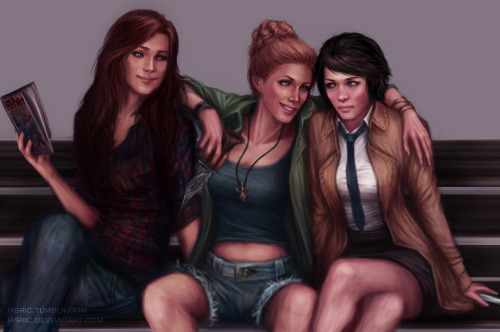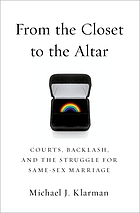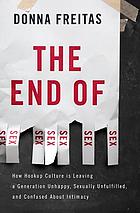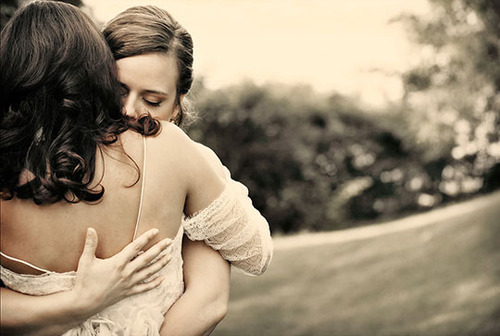 |
| Sam, Dean and Cas ... re-imagined (by jasric) |
Our friend
tiptoe39 has been authoring
a series of posts on "shipping" and fan works over at SpoilerTV, and for the last few posts she's created surveys to help her generate content. Here are my responses to her survey on "shipping as...creativity":
How does shipping enhance your creativity?
I think shipping kicks my creativity into gear in part because it pushes my political buttons as a bisexual woman and as a feminist: I experience shipping as a direct intervention in mainstream narratives. It is a form of critically interacting with books, movies, television series that depict human sexuality and human relationships in certain ways, challenging the stereotypes, assumptions, or erasures I see there and re-working the source within the fanwork to tell a different version of events.
This is going to sound like a weird comparison, but I once attended a talk by Jane Yolan on faith and writing, in which she talked about how some people viewed writing from a Christian perspective as a negative constraint on creativity -- but instead she saw it as a limitation that fueled creativity because it gave you a framework that you had to work with ... creatively.
I think fan fiction can work in a similar way to writing "Christian fiction" ... in that you have a starting set of assumptions (the canon work) that's sort of there as a de facto set of prompts. And then whatever inspiration you have for your work, you'll have to be clever enough to put those two things together. Fitting form (the original material) with function (your particular vision in this instance). It's a challenge that I think can actually amp up someone's creative juices, because you can't afford to be lazy about it. (If nothing else, your fellow fans will call you on it!)
How does viewing fanworks by others enhance your creativity?
God, I love the creativity of my fellow fan creators. I'm constantly awed by the dedication with which so many of us write/draw/paint/edit/enact/etc. It's wonderful to take in so many visions of the same core material; to see how many ways the same narrative(s) can be improvised upon when humans put their minds to it. I definitely feel that my exposure to fanworks and the people who created them has taught me to look at the world in a more multi-faceted way. I see everything through "slash goggles" now, a perspective that necessarily involves holding more than one understanding of a work in mind (and heart) simultaneously.
Fellow writers have also taught me a LOT about the construction of effective erotica; I do believe I have a strong original voice in that regard, but I'm not going to kid myself into thinking I spontaneously learned how to write smut well. I learned it from my fellow fic-writers (thank you!).
What are you able to do creatively with shipping and fanworks that you cannot do with "original" creative works?
I've always been a person who thinks best "aloud," in dialogue with others. With shipping (and fan fiction writing) that conversation is a built-in feature of the activity from the start: you're in dialogue with the original work that inspired the fan work! I get incredible satisfaction out of participating in that conversation; it generally brings me into a much closer and more positive relationship with the original work (even when I'm highly critical of it) than I would be as a more passive consumer of the original work.
I have very little experience with non-transformative fictional work (my non-transformative writing has been in the genres of academic/scholarly papers and creative nonfiction essays / blogging -- also forms of conversation in their own right!). But I have tried my hand, occasionally, at non-transformative fiction and I often run out of steam at some point, I don't have the social accountability to finish the story that the fandom provides. I think I also felt less of a sense of purpose with non-transformative work (it feels less politicized, less like an intervention, which are key kicks-in-the-ass for me as a writer).
What is your response to the idea that those with creative inclinations should work from their own characters and worlds rather than appropriating another's?
I understand the concern of creators who feel threatened by fan works. At first blush, fan works can look like an authorial power-grab, like plagiarism. However, I'd encourage people who are framing fan creations as plagiarism to reconsider that assumption. Instead, I'd argue that fan works are a form of reader/viewer response to the original piece. Like literary or film criticism, they are responsive to the original work, cannot exist (are often meaningless) without that original work with which they are interacting -- usually with a mix of praise and critique.
As long as the pieces are clearly framed as such (transformative works by fans), and the creators are not making money from their creations or passing their work off as actually by the original creator(s), I would argue that original creators can only benefit from the fan community getting excited about their creation enough to generate those responses. That responsive interaction will likely translate into investment in your original creation, which -- if you're a professional of any kind -- is going to translate into a larger audience, higher profile, more income. As a fan creator myself, I'll be honest and say that at least half of the original creations I create for I would not be reading or watching if I were not invested in creating fan works from them. The fan creation IS my investment in the work, my conversation with it.
Finally, as an historian I would point to the fact that fan works have a long history, as does the tradition of artistic inspiration, musical "quotation," fashion trends, and other conventions of one original work informing another very directly. While the Internet and other technologies have made this type of interaction more visible, I would argue it has long been a part of the equation in creative economies. This does not mean that creative rights concerns are invalid -- in fact, they are crucial to continue defining and advocating for -- but it does mean that there is precedent for original works and transformative works living side-by-side in mutual benefit.
Is there anything about shipping, or the shipping community, that limits you as an artist, creator, or consumer?
Well, I don't think this is exactly the kind of "limit" you're looking for, but I have sometimes found myself as frustrated by the tropes of certain fandoms, and the imbalance of having an endless supply of fic along certain themes, for certain fandoms, and then radio silence along other lines, in other fandoms. Obviously people are inspired to write what they're inspired to write. But fan works, like original works, are not created in a vacuum. So I think it's legitimate to note that there are relatively few sexually explicit fan works featuring female couples (compared with the huge pool of m/m slash out there). This can be a self-perpetuating cycle as fan communities reinforce excitement over certain pairings and fans who create in collaboration or through inspiration from one another gather around certain fandoms or pairings and not others.
I will include myself in this indictment: I write both female and male pairings, but in latter days I've been working on male pairings in part because that's where the community reinforcement comes from. My two Supernatural fics have far and away the most views, kudos, and comments on AO3 of all my fic. The next-highest story in terms of exposure and praise is a female pairing for Downton Abbey that's been up for almost two years, and is still only half the views as the Supernatural piece that's been up for five months.
So I think that even though the fan community often pushes back against canon, and the limitations of mainstream media in terms of human sexual diversity and other types of diversity, they are still often constrained by the "givens" of particular fandoms, and by the pressures of "the market" -- even though it's not a financial economy, but more of a social economy.
And, you know, we're human. So to the extent the culture we are steeped in perpetuates racism, sexism, classism, abelism, ageism, etc., etc., etc., as creators/consumers we're going to fall into those limiting traps as well, from time to time.
How would you characterize the community surrounding fanworks? (If you have also created non-fan creative works, can you compare the two communities? Those who read/consume are also welcome to compare the two communities.)
Overall, incredibly positive. These are people who take pleasure in what they do, and who generally engage in the activity as a leisure-time activity, as something fun and joyful. I really appreciate that fan creators are amateurs ("lovers") of their craft.
For myself, the pleasure I get from participation in the fanwork community is enhanced by the fact that my creative expression here is option, is non-professional, is what I do for pleasure rather than for work. I am also creative (even writing-creative!) in my professional life, and that feels more deadline driven and like it has a higher risk level to it than in the fanwork community. I feel more alone and (potentially) judged, like there is a much narrower margin for error in that context.
My fan creations are lower risk because they can be revised and updated as want them to be, and I find my audience to be incredibly supportive and forgiving. Fans are pretty good with the constructive part of constructive criticism -- they WANT your work to succeed, and get better, at what it's trying to do. It's rather like blogging, in that respect, only with no trolls! Which is lovely.
And I don't want it to sound like I haven't had incredibly warm and supportive feedback from my mentors in the professional settings I move in, either -- they've been unbeatable! But the stakes there just feel bigger in terms of being taken seriously as a ______. Fans will pretty much take you seriously as a fan as long as you're enjoying yourself and the object of your fannish love.
I would say particular fandoms strike me (in my early 30s) as "young" by comparison ... but that varies really a lot by fandom, so it's not a generalization.
Fan fiction authors also seem to be majority women, but again that would be a gross a generalization in terms of fan participation in responsive mediums.
What are the major problems you see within and surrounding shipping and fanworks?
I don't know if I'd characterize any of these as "major problems" but I do see them as ... problematic? issues that fans as a community might do well to have conversations about.
1) RPF. Real-person fic is something I have major reservations about, as it feels non-consensual and intrusive to me. There's a difference between someone choosing to portray themselves (or consenting to have themselves portrayed) in a sexual way, publicly, and to have other people create sexually explicit material about them -- even with positive, fannish intent! -- and make that public. It feels stalkery and, like I said, majorly non-consensual. I think it's a kissing cousin of "revenge porn" -- where sexually explicit pictures of videos (real or faked) of a person is released to the public as a form of character defamation.
2) Over-identification and emotional investment. This is something I tred carefully on because obviously fans have a long history of being characterized as hysterical, too passionate, etc. (what is too passionate, even, right??). But I have definitely come across people who use fandoms to validate their own identities (like, a character HAS to be gay or they can't deal, or -- conversely -- the idea that a character could be read as lesbian freaks them out and pushes them into defensiveness). And I've also seen people using fanwork to manage their own trauma or mental health which is totally appropriate alongside getting other forms of help, but I sometimes feel like fanwork is not a replacement for therapy, medication, a social support network, [insert need here].
3) Territorialness. So one of the great things about fans can be our generosity and collaborative spirit. ... and one of the worst things about fans can be our sense of ownership of a particular interpretation of a canon piece. To the extent that people sometimes abuse the folks who support "rival" interpretations, and even abuse original creators whose vision differs from their own. It's one thing to critique a creator's vision (the direction a series is going, something they do to a character, etc.) ... but I also think it's important to remember that just as WE (the fans) have a right to our vision of the story or character, so do other fans and the original creator.
Anything else you would like to add about shipping as creativity?
Whew! I think this form has me beat, so I'm going to leave it at that :) ... looking forward to the post!


















